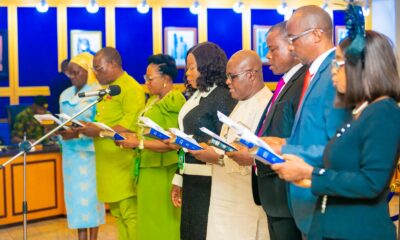Business
‘Renewable Energy Hits 2,000 Gigawatts’
Renewable energy installed in 2016 hit 2,000 gigawatts, with more countries embracing shift in energy sources from fossil, a Renewable Energy Policy Network for the 21st Century (REN21) report, said.
The UN Environment Programme (UNDP), hosted global renewable energy policy multi-stakeholder network, also revealed that, more renewable energy increased nine per cent from 2015 to 2016.
“The world is now adding more renewable green energy capacity each year than it adds in new capacity from all fossil fuels combined.
“Last year, renewable power instalments increased by nine per cent over 2015 to nearly 2,017 gigawatts.
“Solar photovoltaic accounted for around 47 per cent of the total additions, followed by wind power at 34 per cent and hydropower at 15.5 per cent,” according to the report.
Christine Lins, Executive Secretary of REN21, while reacting to last week’s U.S. withdrawal from the Paris Climate Agreement, said “renewables train has already left the station”.
Lins warned that, “those who ignore renewables’ central role in climate mitigation risk being left behind”.
“The world is in a race against time.
“The single most important thing we could do to reduce CO2 emissions quickly and cost-effectively, is phase-out coal and speed up investments in energy efficiency and renewables.
“The withdrawal of the United States from the Paris Agreement is unfortunate.
“But the renewables’ train has already left the station and those who ignore renewables’ central role in climate mitigation risk being left behind,” he said.
The Executive Director of UNEP, Erik Solheim, responding to the REN21 report launch, said, clean energy was non-negotiable to a healthy humanity.
“A world that does not run on fossil fuels is no longer a far distant dream with the recorded exponential growth in solar and wind.
“Although investments in renewables are diametrically different,” the UNEP chief said.
Solheim, added that, “we all want a healthy environment and healthy people, and clean energy is central to the solution.
“As the shift to clean powercontinues, renewables are becoming the least costly option as recent examples in Denmark, Egypt, India, Mexico, Peru and the United Arab Emirates show.
“The example shows that energy has been delivered well below the equivalent costs for fossil fuel and nuclear energy in each of these countries.
The report showed that, for the fifth consecutive year, investment in new renewable, including all hydropower, roughly doubled the investment in fossil fuel generating capacity, reaching about 250 billion dollars.
Chair of REN 21, Mr Arthouros Zervos, pointed out “as the share of renewables grows, we will need investment in infrastructure as well as a comprehensive set of tools”.
Business
NCDMB, Dangote Refinery Unveil JTC On Deepening Local Content

Business
Industry Leaders Defend Local Content, … Rally Behind NCDMB

Business
Replace Nipa Palms With Mangroove In Ogoni, Group Urges FG, HYPREP

-
Politics2 days ago
Atiku’s Exit No Problem To PDP – Makinde
-

 News2 days ago
News2 days agoRivers Police Arrest Notorious Cultist, Recover Sophisticated Ammunition
-

 Rivers2 days ago
Rivers2 days agoNigeria Customs Intercepts 16 Containers Worth Over N20bn
-

 News2 days ago
News2 days agoIbas Inaugurates RSIEC, Service Commissions, Healthcare Board In Rivers …Charges Appointees To Embrace Principles Of Service
-
Rivers2 days ago
Monarch Cautions Youths Against Illicit Drug Consumption
-
Rivers2 days ago
Okrika Administrator Seeks To Connect Okujagu Ama To National Grid … Donates 30 Life Jackets To Okujagu Ama Boat Drivers
-

 News2 days ago
News2 days agoNIMASA Shuts Two Lagos Terminals Over Security Breach
-
Politics2 days ago
Alleged Money Laundering: Fayose Has No Case To Answer, Court Tells EFCC

